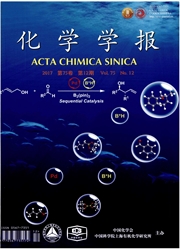

 中文摘要:
中文摘要:
将聚甲基丙烯酸甲酯材料在多壁碳纳米管表面原位聚合,利用这种修饰的碳纳米管作为基质辅助激光解析离子化(MALDI)的基质,利用修饰后的碳纳米管可以“溶解”的特性实现了稳定的MALDI离子化,并且消除了在低质量端的基质噪音.此类聚合物衍生的碳纳米管具有相对较好的亲水性表面,可“溶解”在溶剂中.此方法适用于有机小分子、多肽、聚合物和蛋白质酶解肽段的质谱分析.实验表明聚甲基丙烯酸甲酯固定化碳纳米管能有效地吸收和传递激光能量,可与样品充分地分散混合,质谱检测背景低,重现性好,具有较宽的可测质量范围.此方法在小分子快速检测和蛋白质组学方面有很大的应用前景.
 英文摘要:
英文摘要:
Polymethyl methacrylate (PMMA) was coated on the surface of carbon nanotubes by in-situ emulsion polymerization, and particle-free matrix assisted laser desorption/ionization mass spectrometry analysis was successfully carried out by applying this kind of soluble carbon nanotube as matrix. The polymer derivatized carbon nanotubes can dissolve in some solvents depending on their good hydrophilic surface. This novel matrix was applied to the mass spectrometry analysis of small organic molecules, standard peptide mixture, polymer and protein digests successfully. The immobilized carbon nanotube with PMMA is not only able to dissolve in the sample solution thoroughly, but also absorb and transfer the laser energy effectively. This novel matrix gained mass spectra with low noise background within a low mass range, good reproducibility of signals and wide mass range. This kind of carbon nanotube has potential application to the rapid analysis of small molecules and peptides for proteomics research.
 同期刊论文项目
同期刊论文项目
 同项目期刊论文
同项目期刊论文
 Surfactant-free synthesis of SnO2@PMMA and TiO2@PMMA core-shell nanobeads designed for peptide/prote
Surfactant-free synthesis of SnO2@PMMA and TiO2@PMMA core-shell nanobeads designed for peptide/prote Immobilized carbon nanotube with polymethyl methacrylate as novel matrix for laser desorption/ioniza
Immobilized carbon nanotube with polymethyl methacrylate as novel matrix for laser desorption/ioniza Wash-free in-situ self-desalting and peptide enrichment by block copolymer analyzed with MALDI-TOFMS
Wash-free in-situ self-desalting and peptide enrichment by block copolymer analyzed with MALDI-TOFMS 期刊信息
期刊信息
